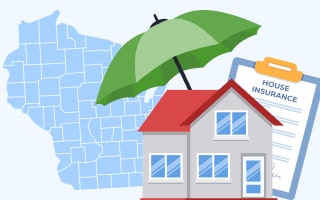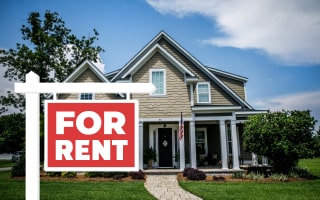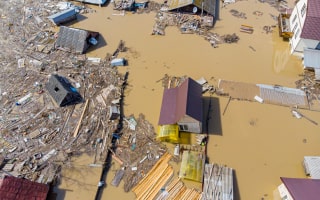Homeowners Insurance in Wisconsin

Wisconsin is the place for you if you like cheese or the Green Bay Packers. Also known as "American's Dairyland", Wisconsin is home to abundant farmland, lakes, coastline, rivers, and forests. Located at the very top of the Midwest, Wisconsin is prone to extreme weather like tornadoes, earthquakes, wildfires, and floods. All of which can cause enormous property damage, resulting in costly claims and insurance losses. Since 1953, Wisconsin has had 47 federally declared disasters, and the rate of disasters per 1 million people is 7.92.
Along with many wind and hail damage claims, Wisconsin residents also file home insurance claims for water damage (due to plumbing issues), electrical fires, visitor accidents, other types of property damage, theft, and vandalism.
Although no U.S. state requires homeowners insurance, officials highly suggest everyone owning property has some coverage. If you borrow money to buy a home in Wisconsin, your financial provider will demand that you purchase coverage and keep your policy active for the life of the loan.
As of October 2024, the average homeowners insurance rate is $2,728 yearly or $227 monthly. Despite the potential perils, Wisconsin homeowners pay an average of $1,475 a year, far less than the national average.
Types of Homeowner Insurance Coverage Available in Wisconsin
Insurance providers decide where to operate across the U.S. based on possible perils and losses. Wisconsin has the potential for some devastating disasters. The available types of coverage in Wisconsin include:
-
Dwelling Coverage: Dwelling coverage pays to repair or replace your home after a covered event like a fire, windstorm, or tree damage.
-
Liability Coverage: If someone gets injured on your property and sues you, liability coverage will pay your legal bills.
-
Personal Property: Personal property coverage protects and replaces your belongings after theft or a qualifying event.
-
Medical Payments: When someone is hurt on your property, medical payments pay for their medical bills.
-
Other Structures: Other structures refer to fences, detached garages, sheds, pools, and other items. This insurance will pay to replace them after a covered peril.
-
Additional Living Expenses (ALE): Whenever you need to vacate your home during repairs or rebuilding after a covered disaster, ALE insurance will pay for you to stay at a hotel and pick up your other expenses (food, laundry, pet boarding, furniture rental, etc.).
Wisconsin experiences floods, so homeowners should consider flood and umbrella policies covering anything outside their normal limits.
FEMA (Federal Emergency Management Agency) manages the National Flood Insurance Program (NFIP) through a network of 50 providers across the U.S.
Since most homeowners insurance does not cover floods, this supplemental coverage can repair damage and replace items after a flood. Depending on the options you choose, it can cover the building and/or your personal belongings. This program is available to homeowners, renters, and businesses. Learn more about the program on FEMA's website.
Home Insurance and Natural Disasters
Global warming and severe weather have hit the home insurance industry hard. They have also caused more frequent natural disasters that result in costly claims and significant losses. Climate change is the number one driver of homeowners insurance rates today. Over just the past five years, rates have increased by 34% across the country and as high as 60% in some areas. In Wisconsin, home insurance rates have risen by 21.4%. Although this is a decent increase, it is still far less than the national average.
Wisconsin experiences some pretty extreme weather like tornadoes, earthquakes, wildfires, and floods. Natural disasters like these can devastate property and cause catastrophic insurance losses. In 2024, Wisconsin had 1,000 wildfires burning more than 2,400 acres. Just one fire claim can cost insurers up to an average of $77,340. The most common claim in Wisconsin is for wind and hail, which costs insurers an average of $11,695. The second most common claim is for water damage, costing an average of $11,650 per incident. From 2015 to 2019, Wisconsin insurance carriers lost a total of $708,497,600. From 1980 to 2024, Wisconsin had a total of 60 billion-dollar disasters.
How Can I Save on Homeowner Insurance Premiums in Wisconsin?
With the rising cost of everything, homeowners must find ways to save money. Home insurance can be a substantial portion of a family's budget. The best way to save on this expense is to learn all about the factors that impact your premiums and make changes from there. Some of those factors include:
-
Location: Your location matters more than anything else. If you live in a high-crime area or one that experiences frequent storms or natural disasters, your rates will be higher than if you live in a quiet, safe location.
-
Your Deductible: The higher your deductible, the lower your rates will be. Conversely, the lower the deductible, the higher your rates.
-
Claims History: If you file many claims or have a history of claims (even with another provider), your rates will be higher than those of someone with no claims.
-
Age of the House: The older the house, the more you will pay for homeowners insurance.
-
Condition of the House: If your house is in good condition, your rates will be better than that of someone with a run-down home.
-
Size of the House: The larger the home, the more insurance you will pay because rebuilding costs more.
-
Risk Factors: If you have high-risk items like a fireplace, hot tub, pool, or fountain, you will pay more for your premiums than if you don't.
-
Materials: The materials used to build your home also matter. The more expensive they are, the more you will pay.
-
Construction Costs: As construction and labor costs increase, your rates will increase along with them.
-
Financing vs. Owned: If you own your home, you can decide how much coverage you buy. If you finance it, your lender will decide.
-
Your Credit Score: Someone with good credit will pay less for home insurance than someone with poor credit.
-
Coverage Amount: The more coverage you purchase, the more you will pay for insurance.
Here are some tips for saving on homeowners insurance:
- Improve Your Credit: Work on improving your credit and then ask your insurance agent to re-assess your rates.
- Don't File Small Claims: Hold off on filing small claims and wait to use your insurance until you really need it.
- Ask for Discounts: Ask your providers for eligible discounts that might work for you.
- Bundle Your Policies: Bundle your policies together, and your insurance carrier will discount your rates.
- Increase Your Deductible: Raise your deductible as much as possible to reduce your rates.
- Make Home Improvements: Improve your home with a new roof, better siding, fire safety, storm readiness, and home security, and your rates could go down.
- Shop Around: Shop around for a provider. Get multiple quotes before deciding.
- Remain Loyal: If you stay with the same provider for many years, they may offer you better rates each year as a reward for loyalty.
- Beef up Home Security: Improve your home security, and your provider should decrease your premiums.
Home Insurance Discounts in Wisconsin
Homeowners insurance is a policy you purchase to protect yourself financially if anything happens to your home. If your house is damaged or destroyed by a covered event, the insurance company will pay to repair or replace it according to the limits outlined in your policy. Most providers offer dwelling coverage, other structures, personal property, liability, medical payments, and loss of use (ALE) coverage. Expensive items or things not covered by your policy will be excluded.
You can purchase home insurance easily. Find a provider you want to work with and contact them through their website. Many have built-in calculators to help you determine coverage and apply online. You could also call their 800 number or find a local agent to provide more personalized service and help you determine your needs based on your situation.
Some of the most common discounts that reputable firms offer include:
- Senior Discount: Some insurance firms offer discounts when you reach a certain age.
- Military Discount: Military personnel and veterans can save on home insurance by requesting a military discount.
- Occupational Discount: Many carriers offer discounts to people who work in specific occupations, such as firefighters and teachers.
- Multi-policy Discount: When you bundle multiple policies with the same provider, they discount your rates.
- Claims-Free Discount: Stay claims-free for as long as possible, and you can save on home insurance.
- Non-smoker Discount: Non-smokers have a lower fire risk and earn a discount because of it.
- Loyalty Discount: When you stay with the same company for many years, you can also get a discount that sometimes increases over time.
- Paperless Discount: Go paperless for your statements; your insurer may give you a small discount.
- Autopay Discount: You pay less when you sign up for automatic payment withdrawals.
- Fire Safety Discount: Install smoke alarms, fire extinguishers, and sprinklers to earn even more money off your rates.
- Security Discount: Install a home security system to monitor for burglars, vandals, and fire, and you can save on your rates.
- New Home Discount: New homes cost less to insure, and you can take advantage of a considerable discount.
- Early Quote Discount: Get quotes early, long before you need them, and your firm may offer you a discount.
- New Roof Discount: Replace your roof with a more storm-resistant one to save money on your insurance.
Common Rates Offer by Homeowners Insurance Firms
New construction homes cost a lot less to insure than older homes. Typically, new homes are constructed using code-compliant materials and processes, making them more robust, more resilient, and thus easier to rebuild. Sometimes, you can save as much as 40% less on new home insurance and as much as 26% on homes five years old or younger. Wisconsin property owners pay an average of $740 for new home insurance, which is far less than people pay with older homes. However, your actual rate will depend on the company you use, your credit score, age, claims history, and other factors.
Top 10 Home Insurance Firms in Wisconsin and Average New Home Savings
| Company | % savings |
|---|---|
| Nationwide | 76% |
| Amica Mutual Insurance | N/A |
| State Farm | 51% |
| Travelers | 63% |
| Allstate | 47% |
| USAA | 54% |
| Erie Insurance | 51% |
| Lemonade | N/A |
| Chubb | N/A |
| Liberty Mutual | N/A |
Home Insurance and Renovations in Wisconsin

There is nothing quite as lovely as refreshing your home with some updates. However, home renovations can dramatically impact your home insurance premiums. Some add value or risk, and your rates go up. Others may reduce risk and your rates, while others may have no effect because even though they reduce risk, they may add value, canceling out any net effect.
![]() Home Renovations that Increase Rates
Home Renovations that Increase Rates
Some home renovations that increase your rates include:
- Adding a Home Office: Working from home intensely improves your work-life balance and increases your home insurance rates.
- Building a Tree House: Treehouses give the kids hours of fun, but insurers say they are an attractive nuisance, and you will get hit with higher rates because of it.
- Metal Roof: Metal roofs can be more robust in the event of a storm, but they are expensive to replace, and your rates will increase if you add one.
![]() Home Renovations that Decrease Rates
Home Renovations that Decrease Rates
Some home renovations that decrease your rates include:
- Fire Safety Stuff: Installing smoke alarms, a sprinkler system, and fire extinguishers can reduce your fire risk, and your provider will also cut your rates to match.
- Replace Your Roof: Install a better roof made to withstand storms better, and your insurer will decrease your rates.
- Install Hurricane Shutters: Hurricane shutters protect your windows against flying debris and wind damage, lowering your insurance rates.
Typically, a new roof will reduce your homeowners insurance premiums. But, if you install fancy, expensive materials like metal, your rates may go up instead or stay the same.
Elective repairs and maintenance are not covered under homeowners insurance. It only pays to replace or repair your home after a qualifying event. Other things not covered are mold, fungus, wear and tear damage, rot, seepage, pollutants, pest infestations, rodents, animal damage, and sewer backups.
Home improvements and renovations can significantly impact your insurance. Whenever you have any major work done on the house, contact your agent and report it to increase the value/coverage of your property. They can help you decide if any changes are necessary.
Wisconsin Renters' Insurance

Wisconsin renters also need homeowners insurance, which differs from regular home insurance. These policies do not include any dwelling coverage for the home's structure. The property owner must cover that on their own policy. Renters insurance does cover personal property and pays to replace your belongings if they are destroyed in a fire, windstorm, theft, or vandalism. Most policies also include liability, medical payments, and loss of use coverage. Anything outside of the policy limits will not be covered.
Some covered perils include:
-
Smoke
-
Fire
-
Windstorms
-
Hail
-
Theft
-
Vandalism
Some of the items that renters insurance covers are:
-
Small Appliances
-
Furniture
-
Clothing
-
Bedding
-
Bath Items
-
Electronics
-
Sporting Equipment
Renters insurance is priced according to three main factors, and they are:
-
Location: Even as a renter, your location matters. If you live in the city, you will pay more than if you live in the country. If your area has many weather events, you will pay higher rates.
-
Coverage Amount: The more coverage you buy, the higher your premiums.
-
Number of Units: The more units in your building, the lower your rates.
Wisconsin renters pay an average of $12-$19 per month ($130-$190 annually), which aligns with the national average of $15-$20 monthly. Renters in urban areas will pay more than those in suburban or rural areas due to the higher crime rate.
Condo Insurance in Wisconsin

Condo insurance is a type of homeowner insurance for condo owners. However, there are some striking differences. For instance, the dwelling coverage covers nothing outside the interior walls. Condo insurance restores all your interior fixtures, flooring, appliances, etc. However, in the event of a disaster like a fire, the condo association's master policy will pay to have the condo rebuilt and restored back to "original" condition. Most condo owners have made updates, and your condo policy will restore it to its most recent condition, making it crucial to have condo insurance in Wisconsin. Additionally, homeowners can have liability insurance that protects them if someone has an accident on their property. With condo insurance, it only protects you if someone has an accident inside your condo.
Renters insurance does not include any dwelling coverage. Condo insurance does, but it only covers "walls-in". Both condo and renters insurance covers personal belongings, but condo insurance also offers "loss assessment" coverage, which covers damage you cause to the condo or any common areas on the property.
Condo insurance is labeled as an HO-6 policy. It covers the inside of your unit, personal property, liability, personal injury, loss of use, and loss assessment coverage. When disaster strikes (fire, theft, storms), your policy will pay to replace things like:
- Wiring and Plumbing.
- Interior Walls.
- Appliances.
- Furniture.
- Carpet/Flooring.
- Light Fixtures.
- Countertops.
- Personal Belongings.
Mold and pests are not covered. Your policy will have limits, and expensive items like jewelry or fur may not be replaced.
Wisconsin condo owners pay an average of $527/year or $44/month, which is less than the national average of $625/year for $60,000 of personal property coverage, $300,000 of liability, and a $1,000 deductible.
Some ways to save on condo insurance include:
- Raise Your Deductible
- Improve Your Credit
- Stay Claims Free
- Shop Around for the Best Rates
- Bundle Policies
- Improve Home Security
- Install Fire Safety Devices
- Ask for Discounts
- Remain Loyal to the Same Provider
- Review Your Policy Every Year
Wisconsin Home Insurance Market
The home insurance market has been in trouble for the past decade, posting record losses due to frequent natural disasters. Wisconsin insurance providers were lucky and came close to breaking even in 2023. Insurers incurred the most negligible losses of any state between Pennsylvania and North and South Dakota. If this trend continues, residents shouldn't have any trouble finding the coverage they need, and the state should enjoy plenty of healthy competition.
Wisconsin is subject to tornadoes, earthquakes, wildfires, and floods, which can devastate property and result in huge losses. If things change in Wisconsin and the state sees more frequent disasters, providers may have to stop offering coverage, limit coverage, or reduce their customer base and drop high-risk customers.
No federal office regulates the home insurance industry. Instead, each state appoints a department or agency to monitor providers and rates, investigate customer complaints, and sanction guilty firms. In Wisconsin, that agency is the Office of the Commissioner of Insurance, located at 125 South Webster Street, P. O. Box 7873, Madison, WI 53703-3474.
Homeowners Insurance Guide
- Homeowners Insurance in Wisconsin
- Types of Homeowner Insurance Coverage Available in Wisconsin
- Home Insurance and Natural Disasters
- How Can I Save on Homeowner Insurance Premiums in Wisconsin?
- Home Insurance Discounts in Wisconsin
- Home Insurance and Renovations in Wisconsin
- Wisconsin Renters' Insurance
- Condo Insurance in Wisconsin
- Wisconsin Home Insurance Market
Instant Access to Wisconsin Property Records
- Owner(s)
- Deed Records
- Loans & Liens
- Values
- Taxes
- Building Permits
- Purchase History
- Property Details
- And More!
Homeowners Insurance Guide
- Homeowners Insurance in Wisconsin
- Types of Homeowner Insurance Coverage Available in Wisconsin
- Home Insurance and Natural Disasters
- How Can I Save on Homeowner Insurance Premiums in Wisconsin?
- Home Insurance Discounts in Wisconsin
- Home Insurance and Renovations in Wisconsin
- Wisconsin Renters' Insurance
- Condo Insurance in Wisconsin
- Wisconsin Home Insurance Market